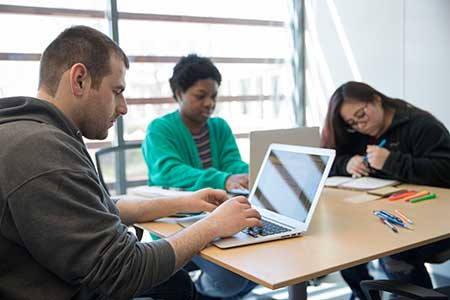Writing in the Discipline

1. Why or in what ways is writing important to your discipline/field/profession?
The Gender and Women's Studies Program at Rhode Island College teaches students to discover and communicate new knowledge about women and gender, to reexamine and reinterpret existing knowledge about women and gender, and to integrate this understanding and perspective into the other disciplines. In the process, our discipline seeks to empower students to come into their own voice as writers and thinkers and encourages them to use that voice in writing to create social change in the world. As a result of our work with students on writing, their voices will be intellectually rigorous as well as personally authentic.
2. Which courses are designated as satisfying the WID requirement by your department? Why these courses?
- GEND 200: Gender in Society
- GEND 201: Feminist Inquiry
- GEND 352: Feminist Theory
- GEND 461: Seminar in Race, Gender and Class
These courses are required for all majors and minors, and represent different levels of development for student writers – introductory, intermediate, and advanced.
3. What forms or genres of writing will students learn and practice in your department’s WID courses? Why these genres?
At the introductory level, students learn the fundamental skills of critical writing as they analyze a wide range of cultural texts through the lens of gender. They also practice self-reflective writing through response papers, journal entries, and other informal writing. Students are taught to think of the writer as observer, analyzer, and critic, and learn to write from these stances.
At the intermediate level, students produce more formal analytic written work than what is produced at the introductory level. They are introduced to the concept of “standpoint” writing, which is feminist writing that makes its own investment and stance transparent and explicit. They learn about the different purposes of writing in our field, including persuasion, analysis, and information. They also learn to synthesize ideas from different texts and artifacts in their writing; and they continue to use self-reflective writing when appropriate. They also learn to discern reliability of sources in their research.
At the advanced level, students are introduced to the writing conventions of the multiple disciplines that participate in Gender & Women’s Studies, including those of the social sciences and the humanities. In this way they learn informational literacy and critical appraisal. Students learn what constitutes evidence in the social sciences and in the humanities and how to employ the conventions of both areas in their own interdisciplinary writing. Students learn how to construct and complete a major research project, from prospectus to final paper, and to research sources for their research writing. Our goal is that students learn to enter the academic dialogue of Gender and Women’s studies in their research and writing. They assess theoretical perspectives that are elaborated by professional writers in the discipline and begin to offer their own contributions. Self-reflective writing at this level is expected to be used strategically in the context of elaborating ideas.
4. What kinds of teaching practices will students encounter in your department’s WID courses?
Discussion and student-centered learning being fundamental pedagogical methods in our field, our courses are designed to help students come into their own voice as writers and critical thinkers. The numerous low-stakes, self-reflective or interpretive writing exercises we offer help students grow in confidence and proficiency as critical writers. Large-scale and high stakes writing assignments are scaffolded such that student success is grounded in learning how to break large projects into manageable smaller chunks. Our WID courses provide writing instruction in the classroom, which includes both in-class guidance from the instructor as well as opportunities for peer-editing. Students also work collaboratively, learning how to construct writing assignments with a partner or group.
5. When they’ve satisfied your department’s WID requirement, what should students know and be able to do with writing?
Students who complete our program will be able to write for a variety of audiences and objectives, whether their purpose is to inform, persuade, or analyze. They will be able to work collaboratively with others on writing projects, to write authentically and to explore their own investment in their writing. Because they have been exposed to texts and conventions of multiple disciplines, students will also be able to adapt to new writing situations with flexibility and agility.

